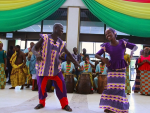The Pan-African Conference on Inequalities in the Context of Structural Transformation agreed on the Accra Declaration on Inequalities in the Context of Structural Transformation.
The Declaration will contribute to the Common African Position on the post-2015 development agenda, and will be used to support Agenda 2063, which is the African Union's (AU) strategy for “the future we want for Africa.”
 30 April 2014: The Pan-African Conference on Inequalities in the Context of Structural Transformation agreed on the Accra Declaration on Inequalities in the Context of Structural Transformation. The Declaration will contribute to the Common African Position on the post-2015 development agenda, and will be used to support Agenda 2063, which is the African Union’s (AU) strategy for “the future we want for Africa.”
30 April 2014: The Pan-African Conference on Inequalities in the Context of Structural Transformation agreed on the Accra Declaration on Inequalities in the Context of Structural Transformation. The Declaration will contribute to the Common African Position on the post-2015 development agenda, and will be used to support Agenda 2063, which is the African Union’s (AU) strategy for “the future we want for Africa.”
The conference, which took place on 28-30 April 2014, in Accra, Ghana, included over 250 participants representing governments, intergovernmental organizations, NGOs, academia, civil society and the private sector. Delegates took part in four thematic dialogues: African Inequalities in the Global Development Agenda – Past, Present and Future; Understanding African Inequalities: Structures, Drivers and Determinants; Lessons in Addressing Inequalities in Africa; and Policy Actions for Tackling Inequalities in Africa.
The Accra Declaration recognizes that inequality is a critical challenge for Africa, noting alongside growth over the last decade, limited decent job opportunities remain, as well as stark inequalities in income, wealth and access to social services. It also highlights increased dependency on the export of primary commodities and minerals, leading to increased import of food and manufactured products. The Declaration emphasizes the trend for decreasing African ownership of its assets, highlighting the issue of global inequality.
The Declaration also: notes that promoting increased value addition, economic diversification, inclusive and sustainable industrial development, and people-centered agricultural transformation is necessary for progress in the region; says the further elaboration of the structural transformation agenda should embrace deliberate policies to tackle economic, social and political inequalities; and supports the pursuit of more job-intensive growth. The Declaration also acknowledges policies to promote, inter alia, income and asset equity, political power sharing and access to the benefits of national resources. The Declaration calls for, inter alia: fair and effective taxation regimes to generate the resources necessary for public investments; investment in independent and publicly accountable statistical capacities; and fundamental changes in power relations.
The Government of Ghana organized the conference in partnership with the Council for the Development of Social Science Research in Africa (CODESRIA), the Danish International Development Agency (DANIDA), the Institute of Statistical, Social and Economic Research, the Society for International Development, Third World Network (TWN) Africa, the UN Children’s Fund (UNICEF), the UN Development Programme (UNDP), the UN Economic Commission for Africa (UNECA) and the UN Millennium Campaign. [IISD RS Meeting Coverage]